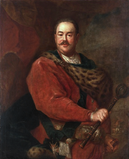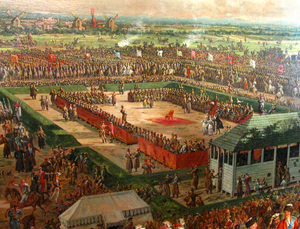Free choice (1764)
 |
||||
|
||||
|
|
||||
| Elected King of Poland and Grand Duke of Lithuania | ||||
|---|---|---|---|---|
| candidate | Stanisław August Poniatowski | Jan Klemens Branicki | Adam Kazimierz Czartoryski | |
| Political party | Familia | republican | Familia | |
| be right | 5,320 | |||
|
|
||||
|
Elected
Stanislaus II August Poniatowski |
||||
The free election of 1764 was the eleventh and last election of its kind to determine the king and grand duke of the Royal Republic of the Polish Crown and the Grand Duchy of Lithuania by the nobility as a whole.
history
The Seven Years' War resulted in Prussia becoming a major European power. As a result of the war, the Royal Republic of the Polish Crown and the Grand Duchy of Lithuania, or Poland-Lithuania for short (see also Rzeczpospolita ) , which was established in 1569, was now surrounded by three great powers - Russia, Prussia and Austria - and was under the almost complete control of the Russian Empress Katharina der Great advice.
After the death of the Polish king August III. dominated by two political camps that expressed their interest in the Polish throne. The Potocki magnates supported the hetman Jan Klemens Branicki , and the influential Czartoryski family supported Prince Adam Kazimierz Czartoryski . Under pressure from Catherine the Great, Adam Kazimierz Czartoryski's candidacy was withdrawn and replaced by the grand ducal cupbearer Stanisław August Poniatowski , who was one of Katharina's lovers.
However, Russia's support for Poniatowski did not automatically mean that he would become the new ruler of Poland-Lithuania. Due to the strong influence from outside, the nobility in Poland-Lithuania was increasingly anti-Russian and Branicki's victory seemed certain for the time being.
However, the Czartoryski family feared a civil war in the election of Branicki, which would be fueled by the Russian Empress if Poniatowski were defeated. They also had no knowledge of the fact that Russia and Prussia had previously concluded a secret pact, which provided for Poniatowski's support through military means. As early as October 17, 1763, Catherine the Great wrote a letter to Frederick the Great, writing that of all candidates for the Polish crown, Poniatowski was the least popular, and that she was grateful to everyone who helped him to vote. On April 11, 1764, Russia and Prussia agreed that both sides would support Poniatowski. He was the most advantageous candidate for Russia because, as the former lover of Catherine the Great, he was a guarantor of the subordination of Poland-Lithuania to Russia.
The Czartoryskis, who in turn were assigned to the political party Familia , viewed themselves as patriots . They advocated far-reaching reforms to counter the impending state collapse of Poland-Lithuania. At the same time they tried to avoid provocations against Russia, which at that time had risen to become the dominant power in Central and Eastern Europe. For this reason, the party leaders of the Familia, Andrzej Zamoyski and August Aleksander Czartoryski , also urged the Russian military to be sent to ensure order during the election.
The Potocki family, who opposed the Czartoryskis and called the Republican Party at the time, supported the maintenance of the Golden Freedom and the Liberum Veto , which had previously dominated the aristocratic-democratic system of the Polish-Lithuanian state.
Election process
The first meeting of the two political camps took place on May 7, 1764 during the convening of the Sejm . The Republicans vetoed all the Czartoryski bills. However, the Russian army, which was stationed near Warsaw , intervened and ordered the republicans to be expelled from the capital.
The actual election, which, as usual , was to take place in Wola near Warsaw at the beginning of September, was attended by around 5000 members of the Szlachta . Poniatowski, supported by Russian and Prussian envoys as well as diplomats from Great Britain and Denmark , was elected unanimously on September 7, 1764.
The election was marred by a large Russian military presence stationed just outside Warsaw. On September 13 of the same year, Poniatowski signed the Pacta Conventa . On November 25, 1764 Poniatowski was finally crowned King of Poland by the Primate Władysław Aleksander Łubieński . The solemn ceremony took place in St. John's Cathedral in Warsaw . Dismayed by the reactions of the Republicans and the nationwide turmoil, Poniatowski did not wear traditional Polish costumes during the ceremony, but rather fashionable clothes based on Spanish robes from the 16th century.
The choice was initially not recognized by France, Austria and the Ottoman Empire, as they saw Poniatowski as a tool of the Russian empress. However, this changed after several interventions by Russian and Prussian diplomats.
As a result, the so-called Confederation of Bar was founded in 1768 , the most important association of Polish noblemen to date. She called for the reintroduction of the Golden Freedom and saw Poniatowski as an externally determined curator and traitor. Their protest culminated in a five-year civil war, which the government troops under Karol Stanisław Radziwiłł were able to win in 1772 . In spite of this, the influence of Russia and Prussia and the conquest of land increased, something which the reforms and the adoption of the modern constitution of May 3, 1791 could not change.
swell
- U. Augustyniak, Historia Polski 1572–1795 , Warszawa 2008
- M. Markiewicz, Historia Polski 1494–1795 , Kraków 2002




